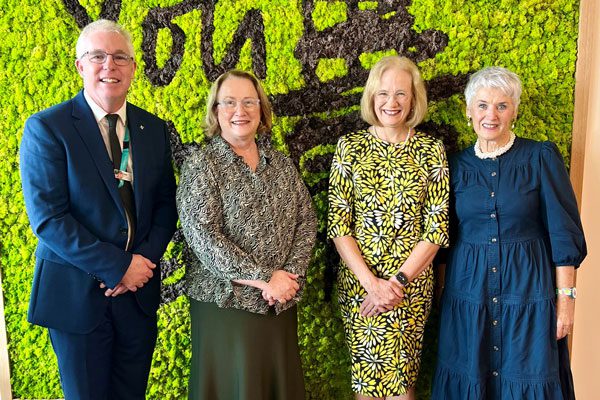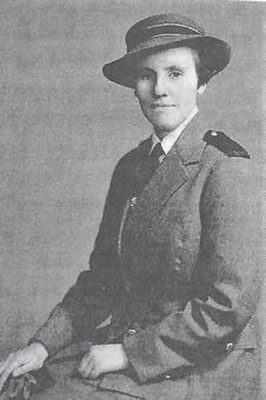
RBWH Executive Director Cancer Care Services Associate Professor Glen Kennedy, RBWH Executive Director Louise Oriti, the Governor of Queensland Her Excellency the Honourable Dr Jeannette Young AC PSM, and Royal Brisbane Hospitals Nurses Association Inc. President Cluny Seager attending the display launch.
Queensland’s largest hospital, the Royal Brisbane and Women’s Hospital (RBWH) is honouring the namesake of one of its main buildings, the Joyce Tweddell Building, with a new display dedicated to the nurse and her contribution to radiation treatment for cancer patients in Queensland.
Joyce Tweddell is widely considered a pioneer in Therapeutic Radiography at the Royal Brisbane and Women’s Hospital, dedicating herself to the treatment of cancer patients following her time spent as a prisoner of war during World War Two.
Ms. Tweddell was born in 1916 and commenced her nursing training at the Brisbane General Hospital (now RBWH) in 1935.
With Australia’s involvement in World War Two increasing, Ms. Tweddell enlisted in the Australian Army Nursing Service in 1941 and was posted to Singapore. Escaping the fall of Singapore, she was aboard the ‘Vyner Brooke’ when it was bombed and sunk by the Japanese. Taken into captivity, she endured the harshness of being a prisoner of war of the Japanese until September 1945. Of the 64 nurses on the ship, just 24 survived.
After being released, she returned to Australia and following her recovery, returned to work in August 1946. Here, she became one of a small group of nursing technicians who pioneered therapeutic radiography for the treatment of cancer and other diseases in Queensland. Rising through the organisation, Joyce Tweddell retired as Chief Radiographer in 1979.

Joyce Tweddell. Photo courtesy of Virtual War Memorial Australia.
Joyce Tweddell was well respected for her courage, personal self-discipline and support of her fellow staff in the defence of Australia and during captivity, as well as her professional focus, excellence and leadership in the therapeutic radiography space.
Today, tens of thousands of patients per year receive life-saving cancer care and infectious disease treatment in the Joyce Tweddell Building at RBWH.
Joyce Tweddell shared her compassion and high standard of patient care through her personal training and guidance of the next generation of radiation therapists. The practice of understanding ‘that machines don’t treat patients, people do’, remains an important part of the cancer care service today.
Metro North Health Executive Director Cancer Care Associate Professor Dr Glen Kennedy said it was important for the hospital to honour Joyce Tweddell and her contribution to cancer care.
“Patients being treated at RBWH often ask who Joyce Tweddell was, what she did and why our cancer care treatment building is named after her, so it was very fitting that we honour her with a display,” Associate Professor Kennedy said.
“We’ve been working closely with the Royal Brisbane Hospitals Nurses Association Inc. to develop a display that sheds light on this remarkable woman’s contribution to medicine.”
Royal Brisbane Hospitals Nurses Association Inc. President Cluny Seager said that Joyce Tweddell’s many achievements were particularly remarkable as they happened at a time when women were not encouraged to seek a career, instead being expected to marry, raise children and keep a home.
“Joyce Tweddell broke all the rules. She was a pathfinder of her time,’ Ms Seager said.
“It’s people like Joyce Tweddell who gave inspiration to others that anything is possible – no matter your gender. Seldom were nurses of the time recognised for their work, however Ms. Tweddell did so much for so many patients with kindness and humility.
“The display will include photos of Ms. Tweddell’s life, and equipment formally used to deliver radiation treatment including a part saved from the Vickers Linear Accelerator(1956) installed at the RBWH, which treated the first patient in Australia with this type of radiation energy .
“The Royal Brisbane Hospital Nurses Association is honoured to curate Joyce Tweddell’s story.”
The Joyce Tweddell display can be seen in the Level 4 foyer, Joyce Tweddell Building, Royal Brisbane and Women’s Hospital.